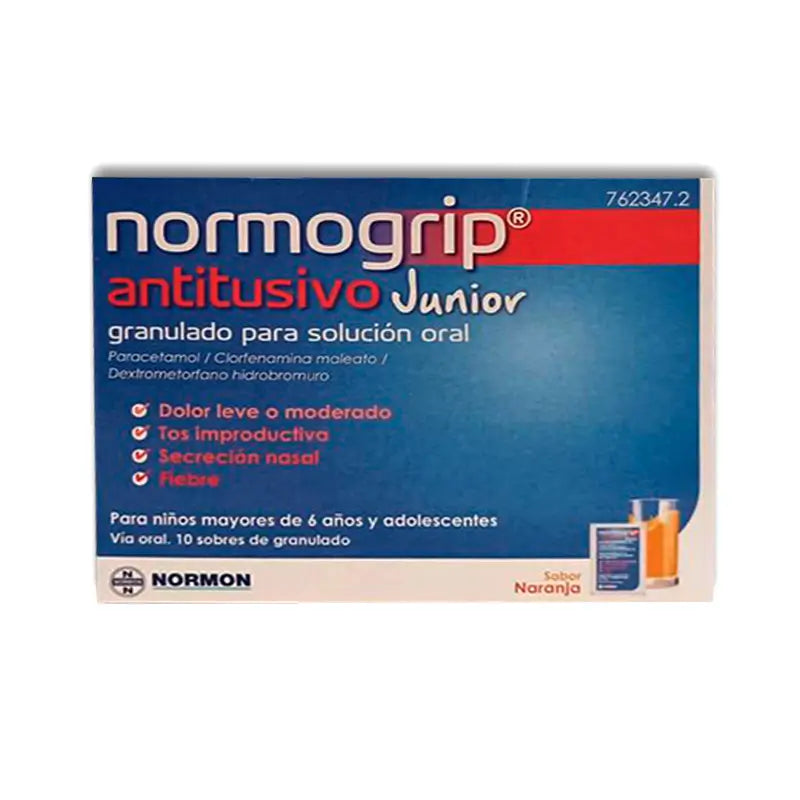It is a medicine with active ingredients that improve the symptoms of colds, flus and colds. Symptomatic relief of colds and flus with mild to moderate pain such as headache, fever, non-productive cough (irritative cough, nervous cough), and runny nose for children .

It is a medicine with active ingredients that improve the symptoms of colds, flus and colds. Symptomatic relief of colds and flus with mild to moderate pain such as headache, fever, non-productive cough (irritative cough, nervous cough), and runny nose for children .
Children over 6 years of age and adolescents with the symptoms described above.
Route of administration: By mouth
Posolog y
Children from 6 to 12 years of age (weight between 21.5 kg and 43 kg): 1 sachet every 6 or 8 hours (3 or 4 times a day) according to need.
Over 12 years of age (weight over 44 kg): 2 sachets every 6 or 8 hours ( 3 or 4 times a day) as needed.
Preferably take 1 dose before going to bed. Do not exceed 4 doses per day.
Hypersensitivity to the active substances or to any of the excipients listed in section 6.1.
Asthmatic cough.
Productive cough.
Respiratory failure.
Severe renal or hepatic insufficiency.
Treatment, concomitant or in the preceding 2 weeks, with:
Monoamine oxidase inhibitors (MAOIs). There is a risk of serotonergic syndrome with concomitant use of dextromethorphan and MAOIs and concomitant use of these medicinal products may cause increased blood pressure and hypertensive crisis (see section 4.5).
Serotonin reuptake inhibitor (SSRI) antidepressants.
Bupropion.
Linezolid.
Procarbazine.
Selegiline.
Do not exceed the recommended daily dose.
Related to paracetamol:
It is recommended to assess the clinical situation:
In patients with liver disease (with or without hepatic impairment) or viral hepatitis, because the risk of hepatotoxicity is increased (see section 5.2).
In patients with anaemia, cardiac or pulmonary disease, and renal dysfunction (in the latter case, occasional use is acceptable, but prolonged administration of high doses may increase the risk of adverse renal effects).
In asthmatic patients sensitive to acetylsalicylic acid,becausebronchospasticreactions with paracetamol (cross-reaction)have been described in these patients, although they only occurred in less than 5% of those tested.
The use of paracetamol in patients who regularly consume alcohol (three or more alcoholic drinks - beer, wine, liquor,...- per day) may cause liver damage. Chronic alcoholics should consult their doctor before taking paracetamol, other analgesics or other antipyretics.
In chronic alcoholics, no more than 2 g/day of paracetamol should be administered.
Concomitant use of more than one paracetamol-containingmedicinal product may lead to intoxication (see section 4.9) and therefore this medicinal product should not be used with any other paracetamol-containing product.
Toxic effects associated with paracetamol can occur either from a single overdose or from multiple intakes with excessive doses of paracetamol.
Each sachet contains 300 mg paracetamol, 2 mg chlorphenamine maleate and 15 mg dextromethorphan hydrobromide.
Excipient(s) with known effect
Each sachet contains 4.1 g sucrose, 2.0 mg orange yellow S (E-110), 0.022 mg benzyl alcohol and max. 0.011 mg sulphur dioxide (E-220 ) .
Always use the lowest effective dose.
Administration of the medicinal product is subject to the appearance of the first symptoms. As symptoms disappear, this medication should be discontinued.
If the patient worsens, or if symptoms persist after 3 days of treatment, the clinical situation should be evaluated.
Concomitant administration of the medicinal product with food and drink does not affect the efficacy of the medicinal product.
